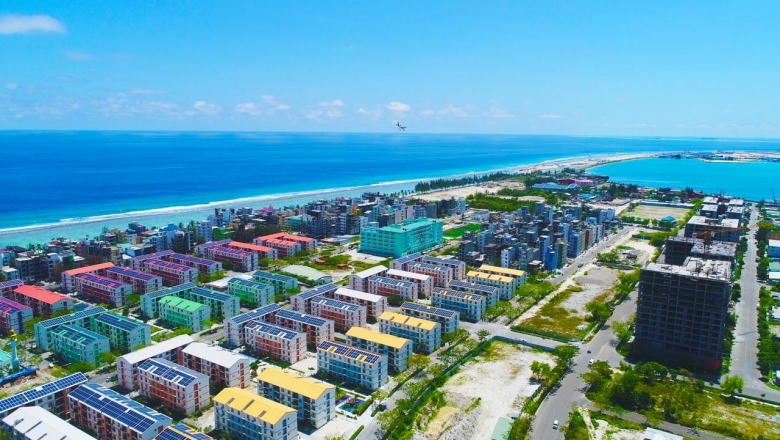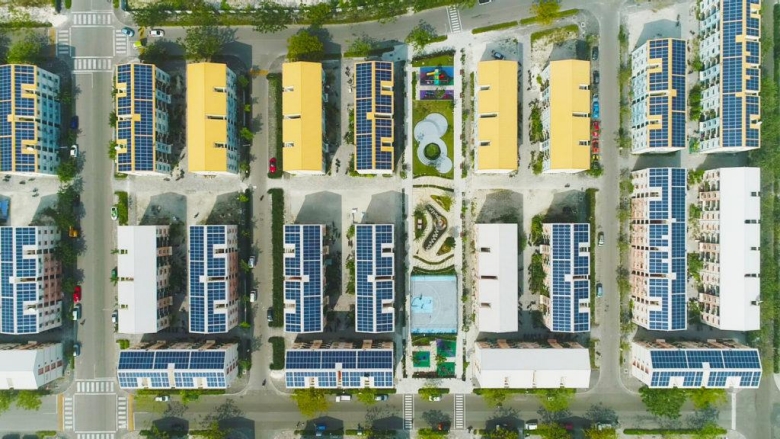The Maldives has always been the Land of Sun, Sea and Sand. Each year, more than a million tourists explore the sunny beaches and blue ocean. Divers come for a swim with the Whale Sharks, Manta Rays, Eagle Rays, and so many varieties of stunning corals.
Beautiful as it is, the Maldives – the lowest-lying country on Earth –must always confront the severity of the climate change crisis. But the COVID-19 pandemic has unleashed new challenges and made existing debt vulnerabilities even worse. As an economy heavily dependent on tourism, the Maldives is expected to be one of the economies hardest hit by the pandemic.
The high level of fuel imports further exacerbates the fiscal challenges in the Maldives. In 2019, the country imported more than 700,000 metric tons of fuel, 80 percent of which consisted of diesel. A significant amount of this imported diesel is used for power generation by the utilities. Reliance on expensive imported diesel for power generation, the lack of economies of scale, and poor quality of infrastructure have resulted in a high cost of electricity service in the country.
Leading by example
In the face of these challenges, the Maldives has consistently focused on increasing the share of renewable energy in its energy mix.
The World Bank has supported the government through the Accelerating Sustainable Private Investment in Renewable Energy (ASPIRE) project, which began in 2014, and the recently launched Accelerating Renewable Energy Integration and Sustainable Energy (ARISE) project.
The Maldives has a net-zero target by 2030, one of the most ambitious targets for an island nation. To help meet this target, the ASPIRE project has supported two rounds of competitive bidding of solar Photovoltaic Independent Power Producers (PV IPPs) with a total generation capacity of 6.5 megawatts (MW) in the Greater Malé region. A comprehensive risk mitigation package was financed by the Bank and offered by the government to reduce risks and leverage private sector investment.
Open for investment
The government has recently announced three more tenders: Two pre-qualification documents on 11-14 MW of solar projects and 40-megawatt hour (MWh) of Battery Energy Storage System under the ARISE project, and an 11 MW request for proposal under the ASPIRE project (Phase Three).
The attractiveness of the Maldives’ energy sector is reflected in the fact that more than 61 global investors showed interest in the pre-qualification of the 21 MW solar Photovoltaic (PV) that was floated during COVID times. The ASPIRE 5 MW project (Phase Two) signed at $10.9 cents in December 2020 not only signals one of the lowest tariffs for a Small Island Developing State (SIDS), but also helps the Maldives gain the pole position in trying to achieve their renewable goals. This will usher in a new phase of innovation for the Maldives, with the new phase exploring the potential for offshore wind, tidal energy, hydrogen fuel cell and electric vehicles (EVs).
A slew of World Bank-funded projects will contribute to reaching the 2030 target. Supported by the World Bank Group, the government also hosted an investor conference on June 23 with global energy leaders and investors. The conference, which saw the participation of over 196 participants including 131 investors from all across the globe, focused on the next steps for the Maldives in achieving its renewable energy goals while highlighting the upcoming investment opportunities in the Maldives renewable energy growth story.
The World Bank Group – International Development Association (IDA), International Finance Corporation (IFC), and Multilateral Investment Guarantee Agency (MIGA) – continue to collaborate closely in implementing major shifts to address the renewable energy and storage needs of the Maldives. The ARISE project will see the support from MIGA in the form of guarantee cover and IFC in the form of stapled financing for the developers.
The ARISE project will leverage the IDA Grant and MIGA guarantees to mobilize investments from the private sector for innovative solar PV subprojects. Financing from the Clean Technology Fund (CTF) and co-financing from the Asian Infrastructure Investment Bank (AIIB) will support battery storage and grid modernization to foster integration of renewable energy into the grid.
A total of $107.4 million will be financed under the project, including $23 million CTF loan for battery storage, $4 million CTF grant to provide liquidity coverage, and $3 million CTF grant for technical assistance. In addition, $6.2 million IDA grant will support a tariff buydown grant to help in mobilizing $45 million of private sector investment. A $6.2 million IDA grant, together with an additional $20 million AIIB loan, will also support grid modernization for Variable Renewable integration (VRE).
Maldives — The Land of Sun, Sea and Sand — will, over the next few years, go from being a tourist paradise to a small island nation that is leading the way in showcasing energy sustainability to the world. The tourists who flock to see the sharks, manta rays and corals will in the future have the additional delight of being welcomed into a nation that has 70 percent renewable energy in its energy planning process. That will be a remarkable achievement for the Maldives and one well worth replicating by many others.


